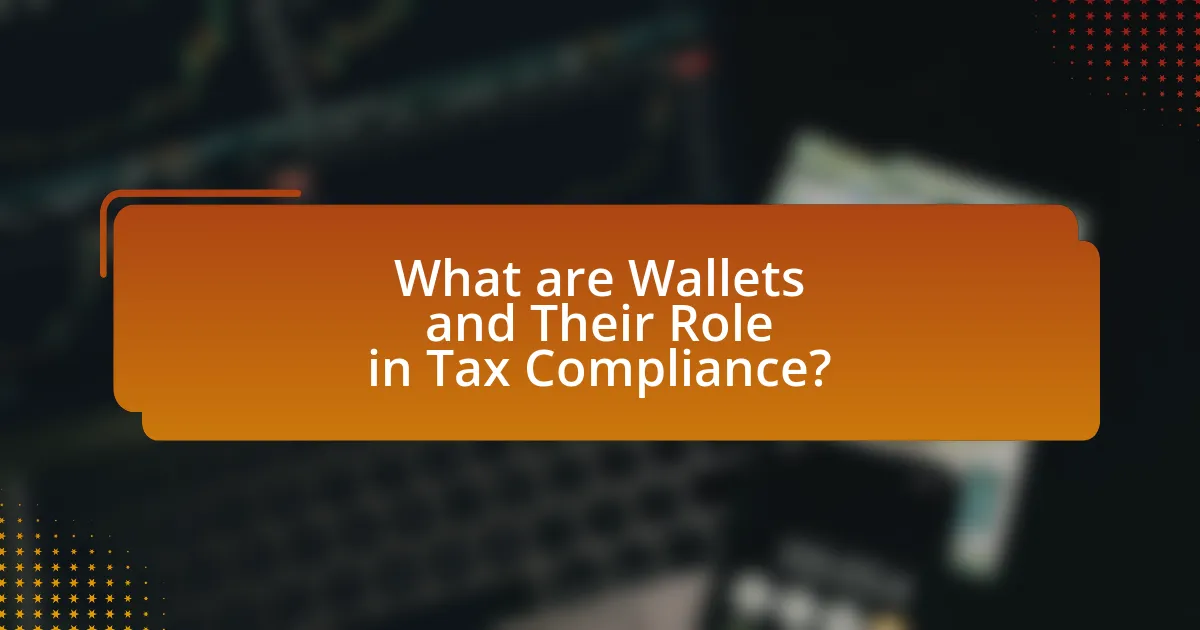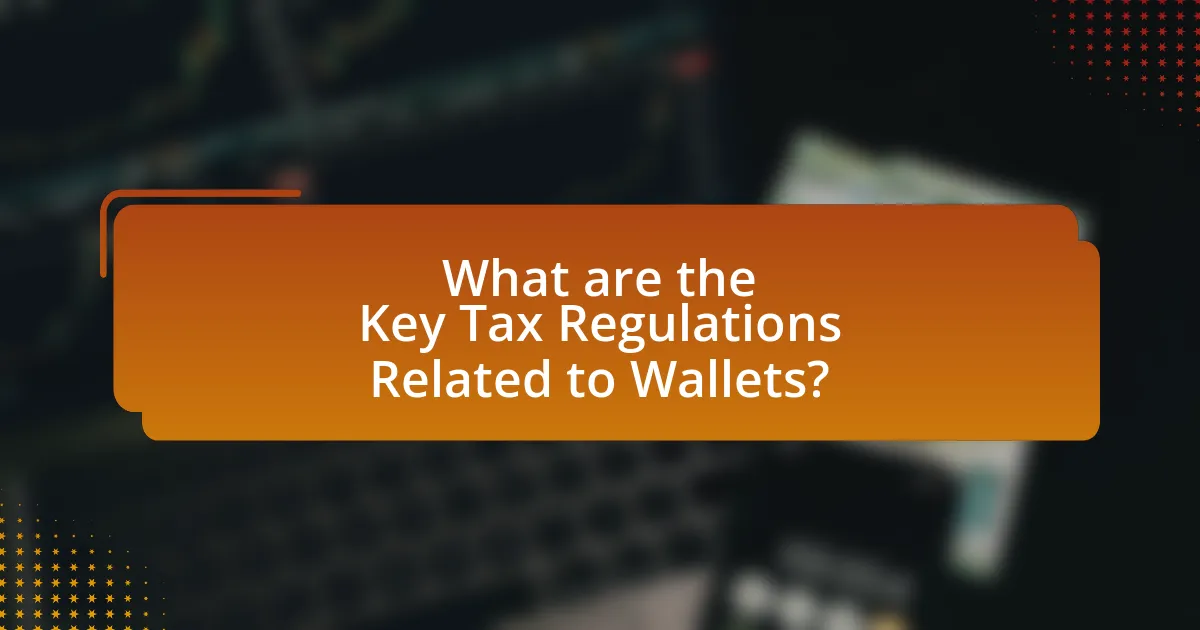Wallets are digital tools essential for storing cryptocurrencies and facilitating transactions, playing a significant role in tax compliance by providing transparent records of financial activities. The article explores how different types of wallets impact tax compliance, the differences between digital and traditional wallets, and the implications of cryptocurrency transactions on tax reporting. It highlights the importance of accurate record-keeping, the legal consequences of non-compliance, and best practices for wallet users to navigate tax obligations effectively. Additionally, the article addresses international regulations and offers practical tips to enhance tax compliance for users engaged in cryptocurrency transactions.

What are Wallets and Their Role in Tax Compliance?
Wallets are digital tools that store cryptocurrencies and facilitate transactions, playing a crucial role in tax compliance by providing a transparent record of financial activities. These wallets enable users to track their income and expenses, which is essential for accurately reporting taxable events, such as capital gains from cryptocurrency sales. The transparency of blockchain technology, which underlies most digital wallets, allows tax authorities to access transaction histories, ensuring compliance with tax regulations. This capability is increasingly important as governments worldwide implement stricter reporting requirements for cryptocurrency transactions, emphasizing the need for accurate record-keeping to avoid penalties.
How do different types of wallets impact tax compliance?
Different types of wallets impact tax compliance by influencing the traceability of transactions and the ease of record-keeping. Hardware wallets, for instance, store cryptocurrencies offline, making it challenging to track transactions unless users maintain meticulous records. In contrast, software wallets often provide transaction histories that can simplify reporting for tax purposes. According to a 2021 report by the IRS, accurate record-keeping is essential for tax compliance, as failure to report cryptocurrency gains can lead to penalties. Therefore, the choice of wallet type directly affects the ability to comply with tax regulations by either complicating or facilitating the documentation of financial activities.
What are the differences between digital wallets and traditional wallets?
Digital wallets and traditional wallets differ primarily in their form and functionality. Digital wallets store payment information electronically, allowing users to make transactions via smartphones or computers, while traditional wallets physically hold cash, cards, and identification. Digital wallets often provide enhanced security features, such as encryption and biometric authentication, which are not available in traditional wallets. Additionally, digital wallets facilitate quicker transactions and can integrate with various financial services, whereas traditional wallets require physical handling of cash and cards. According to a 2021 report by Statista, the global digital wallet market was valued at approximately $1.1 trillion, highlighting the growing preference for digital transactions over cash-based methods.
How do cryptocurrency wallets affect tax reporting?
Cryptocurrency wallets significantly affect tax reporting by determining how transactions are tracked and reported to tax authorities. Wallets store the private keys necessary to access and manage cryptocurrencies, and the type of wallet used—whether custodial or non-custodial—impacts the reporting requirements. For instance, custodial wallets, managed by third parties, often provide users with transaction histories that can simplify tax reporting, while non-custodial wallets require users to maintain their own records of transactions. According to the IRS guidelines, taxpayers must report capital gains and losses from cryptocurrency transactions, making accurate tracking through wallets essential for compliance. Failure to report these transactions can lead to penalties, emphasizing the importance of understanding how different wallet types influence tax obligations.
Why is tax compliance important for wallet users?
Tax compliance is important for wallet users because it ensures adherence to legal obligations, preventing potential penalties and legal issues. Wallet users, particularly those engaging in cryptocurrency transactions, must report their earnings accurately to tax authorities. Failure to comply can result in fines, audits, or even criminal charges, as evidenced by the IRS’s increased scrutiny on cryptocurrency transactions since 2014. Additionally, maintaining tax compliance fosters trust and legitimacy in the financial ecosystem, which is crucial for the broader acceptance and integration of digital wallets in mainstream finance.
What are the legal implications of non-compliance?
Non-compliance with tax regulations can lead to significant legal implications, including penalties, fines, and potential criminal charges. For instance, the Internal Revenue Service (IRS) imposes penalties that can reach up to 25% of the unpaid tax amount for failure to file or pay taxes on time. Additionally, willful tax evasion can result in criminal prosecution, leading to imprisonment for up to five years and substantial fines. These legal consequences underscore the importance of adhering to tax compliance requirements, particularly for individuals and businesses utilizing digital wallets for transactions.
How can tax compliance enhance financial security?
Tax compliance enhances financial security by ensuring individuals and businesses meet their legal obligations, thereby avoiding penalties and fostering trust with financial institutions. When taxpayers comply with tax regulations, they reduce the risk of audits and fines, which can lead to significant financial strain. Additionally, compliant taxpayers often have better access to credit and loans, as lenders view them as lower-risk borrowers. According to a report by the Organisation for Economic Co-operation and Development (OECD), countries with higher tax compliance rates experience greater economic stability and growth, further supporting the notion that tax compliance is integral to financial security.

What are the Key Tax Regulations Related to Wallets?
Key tax regulations related to wallets primarily involve the reporting of transactions and the classification of digital assets. In many jurisdictions, wallets that hold cryptocurrencies are subject to capital gains tax when assets are sold or exchanged, requiring users to report gains or losses on their tax returns. For instance, the Internal Revenue Service (IRS) in the United States mandates that taxpayers report cryptocurrency transactions, treating them as property for tax purposes, which means that any sale or exchange triggers a taxable event. Additionally, regulations may require wallet providers to comply with Know Your Customer (KYC) and Anti-Money Laundering (AML) laws, which can affect how users manage their wallets and report their holdings.
What specific tax laws should wallet users be aware of?
Wallet users should be aware of capital gains tax laws, as transactions involving cryptocurrencies are often treated as taxable events. When a wallet user sells or exchanges cryptocurrency, they may incur capital gains or losses, which must be reported to tax authorities. According to the IRS guidelines, if the fair market value of the cryptocurrency at the time of the transaction exceeds its purchase price, the user is liable for capital gains tax on the profit. Additionally, wallet users should understand that they are required to report any income received in cryptocurrency, as it is treated as ordinary income. This includes payments for goods or services, which must be reported at the fair market value on the date of receipt.
How do capital gains taxes apply to cryptocurrency transactions?
Capital gains taxes apply to cryptocurrency transactions when an individual sells or exchanges cryptocurrency for a profit. The Internal Revenue Service (IRS) classifies cryptocurrencies as property, meaning that any gain realized from the sale or exchange is subject to capital gains tax. For instance, if a person purchases Bitcoin for $5,000 and later sells it for $10,000, the $5,000 profit is considered a capital gain and is taxable. The tax rate depends on the holding period; short-term capital gains apply if the asset is held for one year or less, while long-term capital gains apply if held for more than one year, typically resulting in lower tax rates.
What reporting requirements exist for digital wallet transactions?
Digital wallet transactions are subject to reporting requirements under various regulations, primarily to prevent money laundering and ensure tax compliance. Financial institutions and payment processors must report transactions exceeding $10,000 to the Financial Crimes Enforcement Network (FinCEN) in the United States, as mandated by the Bank Secrecy Act. Additionally, digital wallets may be required to report transactions to the Internal Revenue Service (IRS) if they involve taxable events, such as the sale of goods or services. This aligns with IRS guidelines that classify cryptocurrencies and digital assets as property, necessitating reporting of gains or losses.
How do international regulations affect wallet users?
International regulations significantly impact wallet users by imposing compliance requirements that affect how they manage their digital assets. For instance, regulations such as the Financial Action Task Force (FATF) guidelines mandate that wallet providers implement Know Your Customer (KYC) and Anti-Money Laundering (AML) procedures. This means that users must provide personal identification information to access certain services, which can limit anonymity and increase the complexity of transactions. Additionally, regulations in various jurisdictions may require wallet users to report their holdings and transactions for tax purposes, as seen in countries like the United States, where the IRS has specific reporting requirements for cryptocurrency transactions. These compliance measures can lead to increased scrutiny of wallet activities and potential penalties for non-compliance, thereby affecting user experience and operational practices.
What are the differences in tax compliance across countries?
Tax compliance varies significantly across countries due to differences in tax laws, enforcement mechanisms, cultural attitudes towards taxation, and administrative efficiency. For instance, countries like Denmark and Sweden exhibit high compliance rates, often exceeding 90%, attributed to strong social contracts and efficient tax administration. In contrast, nations such as Italy and Greece face lower compliance rates, around 60-70%, often due to complex tax systems and widespread tax evasion. Research by the Organisation for Economic Co-operation and Development (OECD) highlights that countries with simpler tax codes and transparent processes tend to achieve higher compliance levels, reinforcing the impact of administrative efficiency on taxpayer behavior.
How can users navigate cross-border tax obligations?
Users can navigate cross-border tax obligations by understanding the tax laws of each country involved and ensuring compliance with reporting requirements. This involves researching the specific tax treaties between countries, which can help avoid double taxation, and utilizing tax software or consulting with tax professionals who specialize in international tax law. For instance, the OECD provides guidelines on international tax compliance, which can assist users in understanding their obligations.

What Best Practices Should Wallet Users Follow for Tax Compliance?
Wallet users should maintain accurate records of all transactions to ensure tax compliance. This includes documenting the date, amount, and purpose of each transaction, as well as keeping track of any gains or losses from cryptocurrency trades. The IRS requires taxpayers to report capital gains and losses, making it essential for wallet users to calculate their tax obligations accurately. According to IRS guidelines, failure to report income from cryptocurrency transactions can lead to penalties. Therefore, utilizing accounting software or consulting with a tax professional can help wallet users navigate their tax responsibilities effectively.
How can users keep accurate records for tax purposes?
Users can keep accurate records for tax purposes by systematically organizing and maintaining all financial documents, including receipts, invoices, and bank statements. This practice ensures that users have a comprehensive overview of their income and expenses, which is essential for accurate tax reporting. According to the IRS, individuals should retain records for at least three years after the tax return is filed, as this timeframe allows for audits and discrepancies to be addressed. Additionally, utilizing digital tools and accounting software can streamline record-keeping, making it easier to categorize and retrieve necessary documents when needed.
What tools and software can assist in tracking wallet transactions?
Tools and software that assist in tracking wallet transactions include blockchain explorers, cryptocurrency portfolio trackers, and accounting software specifically designed for cryptocurrency. Blockchain explorers, such as Etherscan and Blockchair, allow users to view transaction histories and wallet balances on the blockchain. Cryptocurrency portfolio trackers like CoinTracking and Delta enable users to monitor their investments and transactions across multiple wallets and exchanges. Additionally, accounting software such as Koinly and CryptoTrader.Tax helps users calculate gains and losses for tax reporting by integrating transaction data from various wallets and exchanges. These tools provide essential functionalities for accurate tracking and reporting of wallet transactions, which is crucial for tax compliance.
How often should users review their wallet activity for tax compliance?
Users should review their wallet activity for tax compliance at least quarterly. This frequency allows individuals to track transactions, assess potential tax liabilities, and ensure accurate reporting. The IRS recommends maintaining records of all transactions, and reviewing wallet activity quarterly aligns with this guidance, helping users stay informed about their financial status and obligations. Regular reviews can also assist in identifying any discrepancies or errors that may arise, ensuring compliance with tax regulations.
What common mistakes should wallet users avoid regarding taxes?
Wallet users should avoid failing to report taxable transactions, as this can lead to penalties and interest from tax authorities. Many users mistakenly believe that cryptocurrency transactions are not taxable, but the IRS treats them as property, meaning that gains and losses must be reported. Additionally, users often neglect to keep accurate records of their transactions, which is essential for calculating capital gains and losses. Not understanding the tax implications of receiving cryptocurrency as income is another common mistake, as this income must also be reported. Lastly, wallet users should avoid relying solely on software or apps for tax calculations without verifying their accuracy, as errors can lead to incorrect filings.
How can misunderstanding tax obligations lead to penalties?
Misunderstanding tax obligations can lead to penalties due to incorrect filings or failure to comply with tax laws. When individuals or businesses misinterpret their tax responsibilities, they may underreport income, overstate deductions, or miss deadlines, resulting in financial penalties imposed by tax authorities. For example, the IRS imposes penalties for failure to file a tax return on time, which can be as high as 5% of the unpaid tax per month, up to 25%. Additionally, inaccuracies in tax returns can trigger audits, further increasing the risk of penalties and interest on unpaid taxes.
What are the risks of failing to report wallet transactions?
Failing to report wallet transactions can lead to significant legal and financial risks, including penalties, fines, and potential criminal charges. Tax authorities, such as the IRS in the United States, require individuals to report all income, including that from digital wallets, and non-compliance can result in audits and back taxes owed. For instance, the IRS has increased scrutiny on cryptocurrency transactions, and failure to report can lead to penalties of up to 20% of the underreported income. Additionally, individuals may face difficulties in proving the legitimacy of their funds, which can complicate future financial transactions or investments.
What practical tips can enhance tax compliance for wallet users?
To enhance tax compliance for wallet users, it is essential to maintain accurate records of all transactions. Keeping detailed logs of every transaction, including dates, amounts, and purposes, helps users provide necessary documentation during tax reporting. Additionally, utilizing tax software or consulting with a tax professional can ensure that users are aware of their tax obligations related to digital assets. According to the IRS guidelines, taxpayers must report gains and losses from cryptocurrency transactions, making it crucial for wallet users to track their holdings and transactions meticulously. Regularly reviewing tax regulations specific to digital currencies can further aid compliance, as these laws can change frequently.


